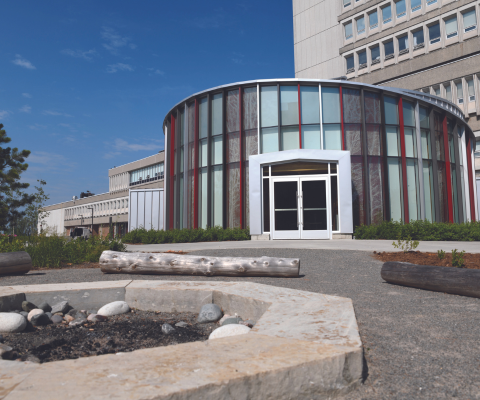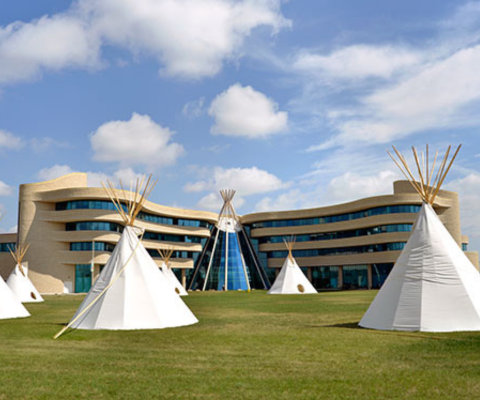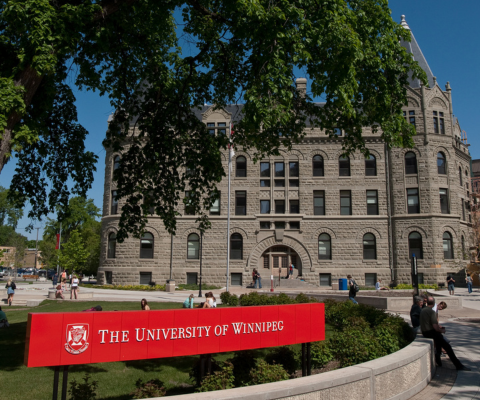Universities Canada principles on Indigenous education

Universities Canada represents universities across Canada, which educate more than a million students each year. Indigenous students continue to be underrepresented in Canadian higher education institutions and our universities are committed to do their part to close this education gap, recognizing the urgency of this issue for the country. Closing the gap will strengthen Indigenous communities, allow Indigenous peoples to continue to strive for self-realization, enhance the informed citizenship of Canadians, and contribute to Canada’s long-term economic success and social inclusion.
There are many reasons to close the education gap. A university education is a transformative experience, expanding knowledge, nurturing critical thinking and inspiring new ideas, creativity and innovation. Closing the education gap will benefit not only Indigenous graduates, but their communities and Canada as a whole.
Beyond these social and cultural imperatives, there is also a clear benefit to Canada’s economy. Canada needs more university graduates to meet labour market demands. Indigenous people can help meet this demand. They are a fast-growing segment of the Canadian population, yet only 9.8 percent of Indigenous people in Canada have a university degree, compared to 26.5 percent of non-Aboriginals. Canada’s universities recognize that tremendous opportunities exist – for Indigenous people and for the country – if we increase access to university education for First Nations, Inuit and Métis. With a university degree, Indigenous people in Canada can earn 60 percent more than their peers with a high school diploma. They experience longer and greater participation in the workforce.
As it continues to advocate for more funding to Indigenous students, Universities Canada and its members are committed to ongoing communication and collaboration with Indigenous communities. Higher education offers great potential for reconciliation and a renewed relationship between Indigenous and non-Indigenous people in Canada. Universities benefit from the presence of Indigenous students and their cultures, making our campuses more open places with wider sources of discovery and knowledge. Mutual respect for different ways of knowing and recognizing the intellectual contributions of Indigenous people is essential to building trust, understanding, and sharing. The cohabitation of Western science and Indigenous knowledge on campuses has the power of opening a dialogue among cultures and enhancing our shared knowledge.
In the spirit of advancing opportunities for Indigenous students, the leaders of Canada’s universities commit to the following principles, developed in close consultation with Indigenous communities. These principles acknowledge the unique needs of Indigenous communities across Canada and their goals of autonomy and self-determination, as well as differences in jurisdiction among provinces and territories, institutional mission among universities, and the authority of appropriate university governance bodies in academic decision-making.
Principles
- Ensure institutional commitment at every level to develop opportunities for Indigenous students.
- Be student-centered: focus on the learners, learning outcomes and learning abilities, and create opportunities that promote student success.
- Recognize the importance of indigenization of curricula through responsive academic programming, support programs, orientations, and pedagogies.
- Recognize the importance of Indigenous education leadership through representation at the governance level and within faculty, professional and administrative staff.
- Continue to build welcoming and respectful learning environments on campuses through the implementation of academic programs, services, support mechanisms, and spaces dedicated to Indigenous students.
- Continue to develop resources, spaces and approaches that promote dialogue between Indigenous and non-Indigenous students.
- Continue to develop accessible learning environments off-campus.
- Recognize the value of promoting partnerships among educational and local Indigenous communities and continue to maintain a collaborative and consultative process on the specific needs of Indigenous students.
- Build on successful experiences and initiatives already in place at universities across the country to share and learn from promising practices, while recognizing the differences in jurisdictional and institutional mission.
- Recognize the importance of sharing information within the institution, and beyond, to inform current and prospective Indigenous students of the array of services, programs and supports available to them on campus.
- Recognize the importance of providing greater exposure and knowledge for non-Indigenous students on the realities, histories, cultures and beliefs of Indigenous people in Canada.
- Recognize the importance of fostering intercultural engagement among Indigenous and non-Indigenous students, faculty and staff.
- Recognize the role of institutions in creating an enabling and supportive environment for a successful and high quality K-12 experience for Aboriginal youth.
Recognizing that other stakeholders have a role to play – governments, businesses, Indigenous organizations – university leaders also commit to the following actions to bring these principles to life:
- Raise awareness within institutions about the importance of facilitating access and success for Indigenous students on campus.
- Raise awareness among government partners and stakeholders of these commitments and the importance of investing in sustainable initiatives that advance higher education opportunities for Indigenous youth.
- Raise awareness in public discourse of positive Indigenous students’ experience in university and their contributions to Canadian society.
- Develop partnerships with the private sector to foster opportunities for Indigenous people.
- Continue to listen to and collaborate with Indigenous communities.
Download Principles on Indigenous education (PDF format)
About Universities Canada
Universities Canada is the voice of Canada’s universities at home and abroad, advancing higher education, research and innovation for the benefit of all Canadians.
Media contact:
Lisa Wallace
Assistant Director, Communications
Universities Canada
[email protected]
Tagged: Indigenous education




